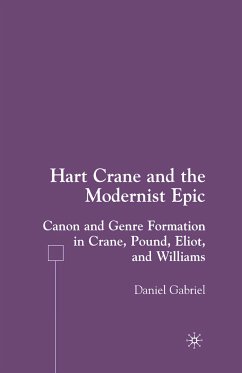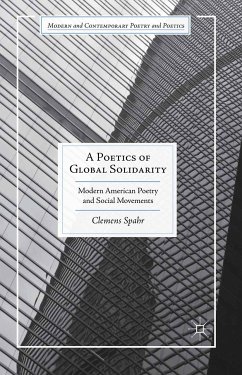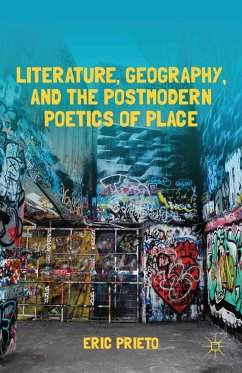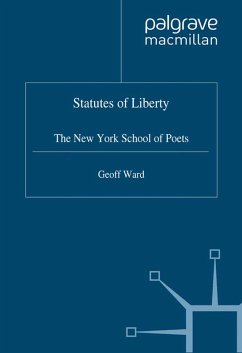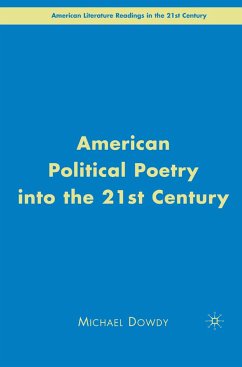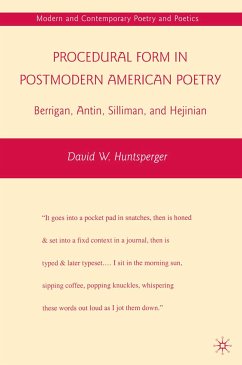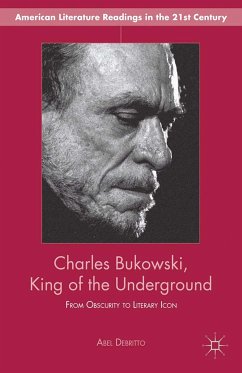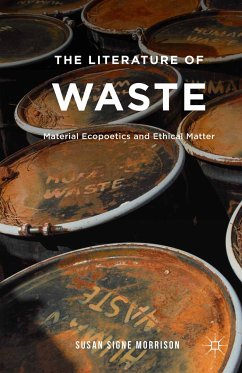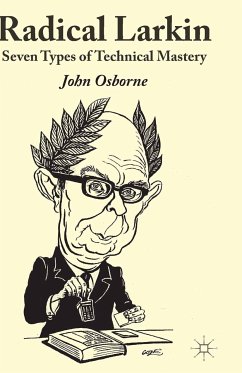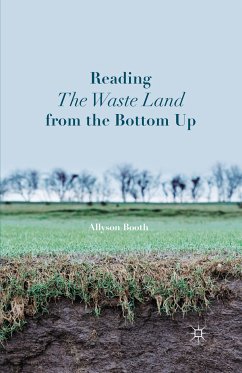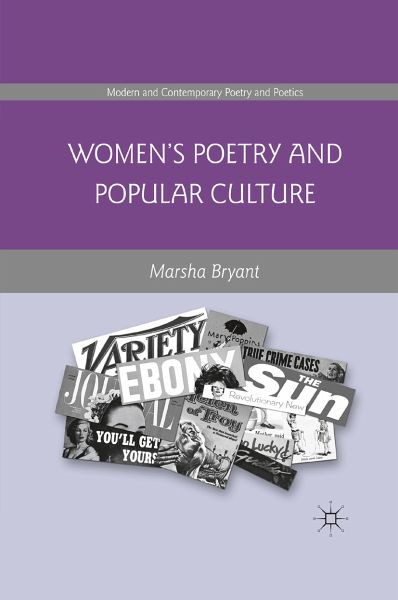
Marsha Bryant
eBook, PDF
Women's Poetry and Popular Culture (eBook, PDF)

PAYBACK Punkte
20 °P sammeln!






Bridging feminist and cultural studies, the book shows how British and American women poets often operate as cultural insiders. Individual chapters reassess major figures (H.D., Gwendolyn Brooks, Sylvia Plath), alternative modernist poets (Edith Sitwell, Stevie Smith), and contemporary poets (Ai, Carol Ann Duffy).
Dieser Download kann aus rechtlichen Gründen nur mit Rechnungsadresse in A, B, BG, CY, CZ, D, DK, EW, E, FIN, F, GR, HR, H, IRL, I, LT, L, LR, M, NL, PL, P, R, S, SLO, SK ausgeliefert werden.
Marsha Bryant is Professor of English at the University of Florida, USA, where she is a three-time Teacher of the Year for the College of Liberal Arts and Sciences. She is the author of Auden and Documentary in the 1930s and the editor of Photo-Textualities: Reading Photographs and Literature. Bryant was the recipient of a fellowship from the National Endowment for the Humanities and contributed to The Unraveling Archive: Essays on Sylvia Plath and Approaches to Teaching H.D.'s Poetry and Prose. Bryant is also an Associate Editor for Contemporary Women's Writing.
Produktdetails
- Verlag: Palgrave Macmillan US
- Seitenzahl: 235
- Erscheinungstermin: 30. April 2016
- Englisch
- ISBN-13: 9780230339637
- Artikelnr.: 47536912
"Bryant (Univ. of Florida) offers a lively interrogation of 'women's poetry' situated within and outside of constructions of popular, contemporary Western culture. Coalescing the poetry of H.D., Stevie Smith, Sylvia Plath, Gwendolyn Brooks, and Carol Ann Duffy with the complexities of a mainstream market comprising domestic advertising, juvenile literature, film, and tabloid journalism, Bryant's provocative work refutes historical conceptions of women's poetry as oppositional to popular culture. Rather, this refreshing fusion of feminist and cultural studies probes the dynamics of women infusing popular culture with poetry written by 'cultural insiders' to chronicle this delicate and complex interplay of popular culture and women's poetry.
Mehr anzeigen
Summing Up: Essential. Lower-division undergraduates through faculty." - CHOICE
'Fact: These days, the most exciting academic work on nineteenth- and twentieth-century poetry is being done by women critics and scholars .The most recent example of such scholarship comes from P&PC hero and University of Florida English professor Marsha Bryant. They are studying poetries in the plural (not Poetry) as cultural forces and as ways of thinking linked both to the everyday and the ideal, with sources in mass, popular, and counter cultures, computers and archives, transnational circuits of exchange, and public and political spheres.' - Poetry and Popular Culture
'In her coda, Bryant envisions a new relationship between poetics and cultural studies. She argues that critics should not only analyze the popular contexts that inform women's poetry, but also the early cultural studies texts that 'often articulate a poetics of popular culture.' In each of her chapters, Bryant models the ways that this type of inquiry necessitates the interpretation of a wide range of cultural texts. In its scope and method, Women's Poetry and Popular Culture is a vital contribution to women's poetry studies and postwar poetry studies.' - Tulsa Studies in Women's Literature
'Byrant's book ultimately calls for a significant widening of the women's poetry canon broader acceptance of a range of themes by women poets and a more sophisticated set of reading pratices that take into account this writing as not simply oppositional, parodic, or critical . . . At once a monograph and a manifesto, Women's Poetry is irreverent, immensely readable, and, frankly, a lot of fun.' - Twentieth-Century Literature
"She [Bryant] effectively illustrates that poetry and popular culture are interconnected and should be studied in relation to one another . . . Bryant's close readings of the poems and strong supporting evidence make it difficult to find a weakness in Women's Poetry and Popular Culture. The book strikes a good balance between formal literary criticism and cultural studies while mostly remaining accessible to readers who may not be familiar with each of the many literary,feminist, and cultural studies theorists with whom Bryant is in conversation." - Women's Studies
'Fact: These days, the most exciting academic work on nineteenth- and twentieth-century poetry is being done by women critics and scholars .The most recent example of such scholarship comes from P&PC hero and University of Florida English professor Marsha Bryant. They are studying poetries in the plural (not Poetry) as cultural forces and as ways of thinking linked both to the everyday and the ideal, with sources in mass, popular, and counter cultures, computers and archives, transnational circuits of exchange, and public and political spheres.' - Poetry and Popular Culture
'In her coda, Bryant envisions a new relationship between poetics and cultural studies. She argues that critics should not only analyze the popular contexts that inform women's poetry, but also the early cultural studies texts that 'often articulate a poetics of popular culture.' In each of her chapters, Bryant models the ways that this type of inquiry necessitates the interpretation of a wide range of cultural texts. In its scope and method, Women's Poetry and Popular Culture is a vital contribution to women's poetry studies and postwar poetry studies.' - Tulsa Studies in Women's Literature
'Byrant's book ultimately calls for a significant widening of the women's poetry canon broader acceptance of a range of themes by women poets and a more sophisticated set of reading pratices that take into account this writing as not simply oppositional, parodic, or critical . . . At once a monograph and a manifesto, Women's Poetry is irreverent, immensely readable, and, frankly, a lot of fun.' - Twentieth-Century Literature
"She [Bryant] effectively illustrates that poetry and popular culture are interconnected and should be studied in relation to one another . . . Bryant's close readings of the poems and strong supporting evidence make it difficult to find a weakness in Women's Poetry and Popular Culture. The book strikes a good balance between formal literary criticism and cultural studies while mostly remaining accessible to readers who may not be familiar with each of the many literary,feminist, and cultural studies theorists with whom Bryant is in conversation." - Women's Studies
Schließen
Für dieses Produkt wurde noch keine Bewertung abgegeben. Wir würden uns sehr freuen, wenn du die erste Bewertung schreibst!
Eine Bewertung schreiben
Eine Bewertung schreiben
Andere Kunden interessierten sich für


